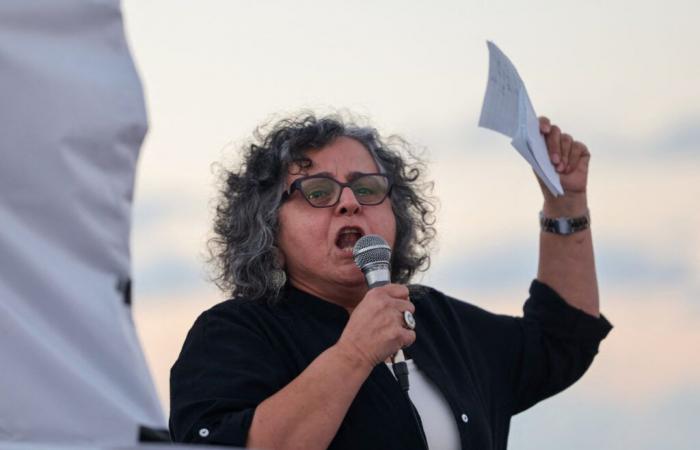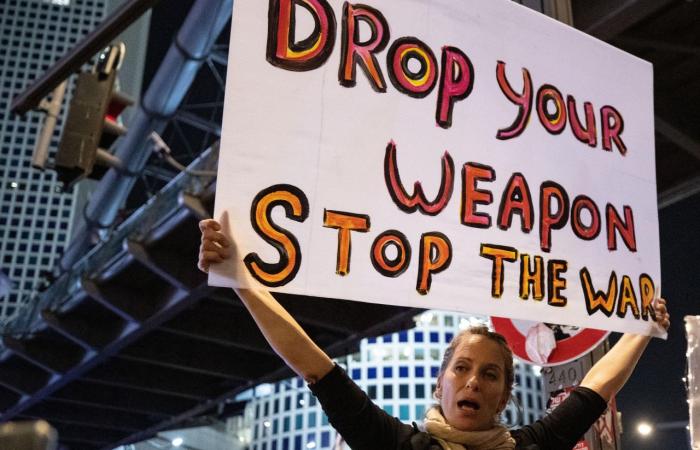Fight for peace. In Israel, even more than elsewhere, the task is difficult. However, this is the choice made by the members of Hadash, a left-wing coalition present in the Israeli Parliament. One of his deputies, the communist Aida Touma-Suleiman, came to Belgium to testify about his fight, and our role in it.
Living in Israel and opposing Zionism is not paradoxical. Hadash has continued on this path since its creation in the 1970s. This alliance of different authentic left parties and organizations, although isolated on the Israeli political scene, is nevertheless present in the Knesset (Israeli Parliament) and in the streets.
“Hadash is the only political voice that strongly opposes the war and denounces the government's crimes. Other parties, even those calling for a ceasefire, do so primarily for pragmatic reasons, such as the release of hostages, and not out of principle. We insist on the ineffectiveness of military solutions and on the need to put an end to the occupation. This is why we have been politically targeted and boycotted by the media since the start of the war,” explains Aida Touma-Suleiman.
For their anti-war positions, but more generally anti-colonization, fight for equality and social justice, the members and sympathizers of Hadash – and human rights in general – are in the sights of Israeli power. The communist activist, feminist and former editor-in-chief of the Israeli Communist Party (ICP) magazine, “Al Ittihad” can attest to this, she who is regularly persecuted inside and outside Parliament.
Latest proof to date, his suspension from Parliament for having denounced the genocide in Gaza on social networks: “I was suspended for two months after sharing on X (Twitter) a British report on the bombing of the Shifa hospital . I cited the testimonies of doctors and questioned the official version of the Israeli army, ironically about the supposed “morality” of the latter. A far-right organization immediately incited the public to file complaints against me, which led to 2,560 complaints in just 12 hours. The Parliament's ethics committee demanded that I apologize for my comments, which I refused, citing my right to parliamentary immunity…”
However, it takes much more to make his contagious smile go away. A few hours before an international arrest warrant was issued against Netanyahu, she was in Brussels. The opportunity to meet members and leaders of the PTB and explain the fight of the Israeli left. In an explosive context: “Since the start of the war, the Israeli government has implemented severe repression against all voices raised against the war, particularly those of the Palestinian community in Israel. All protests were banned, and more than 250 people, including artists, students, and even the elderly, were arrested on sometimes absurd charges, such as posting a simple “Hello” on social media or wearing a ring containing a religious inscription. »
Which does not prevent the left from continuing its path: “We have taken the responsibility of being the only voice opposed to the war in Israel, even in a context of threats and repression. We also work to create coalitions for peace. »
The Israeli government wants to further weaken critical voices through judicial reform. How is it problematic?
Aida Touma-Suleiman. Judicial reform aims to weaken the authority of the Israeli justice system, placing politicians above this institution. For example, legal advisers to ministries, previously independent, would come from political appointments. This aims to reduce checks and balances to allow the government to freely implement its policies, including in the occupied West Bank. This reform reflects a desire for increased control. This is an undemocratic attack.
How do these laws change human rights protection in Israel?
Aida Touma-Suleiman. Several laws recently adopted under the guise of the fight against terrorism or a state of emergency have seriously violated human rights. A law allows teachers suspected of supporting alleged “terrorism” to be immediately dismissed, without them being formally tried or convicted, for example. And another law authorizes the expulsion of families of people accused of acts of resistance. These measures not only target Palestinians, but also take away fundamental rights from Israelis.
In addition to the police and the army, the government also counts on civilians to impose its policies. What is the role of armed civilian militias in the current context?
Aida Touma-Suleiman. Since the start of the war on October 7, 2023, 120,000 weapons have been distributed to civilians by the Minister of National Security. These militias, formed quickly, can be mobilized to support government policies, creating a threat to protesters and political opponents. Attacks have already taken place against peace demonstrators. This illustrates a dangerous drift towards institutionalized violence.
Israel is sometimes presented as “the only democracy in the Middle East”. Do you think this is the case?
Aida Touma-Suleiman. Israel has always been a democracy primarily for Israeli Jews, not for all of its citizens. This is an “ethnic democracy,” where discriminatory laws and policies have been applied to Palestinian citizens of Israel and the working class in general. With the current right-wing government which includes fascist components, this ethnic democracy is being pushed aside in favor of even more authoritarian and anti-democratic policies.
What obstacles does Israeli civil society encounter in making voices opposed to the war heard?
Aida Touma-Suleiman. Public opinion is totally focused on the release of the hostages held by Hamas. As long as this situation persists, it is almost impossible to begin a debate on the consequences of the war or on a political solution. Netanyahu's government is exploiting this fixation to prolong the war and prevent any questioning of its policies.
Is this why the Israeli government is not seeking to speed up their release?
Aida Touma-Suleiman. Netanyahu understands that the war will lose support as soon as the hostages are released. At that point, citizens will start asking questions about the war, about human losses, and about economic problems. By keeping the country suspended pending the release of the hostages, he ensures that public opinion remains focused on this single subject, to the detriment of any critical reflection on the consequences of the war.
In wars, it is always the working class that is most affected. How has the war affected workers in Israel, particularly in economic terms?
Aida Touma-Suleiman. The war exacerbated an already serious economic crisis. The northern and southern regions of Israel, which were the country's main agricultural areas, were evacuated and bombed. This led to a shortage of food, forcing Israel to import fruits and vegetables, driving up prices. Additionally, the war interrupted the flow of Palestinian workers, particularly in the construction sector, where approximately 200,000 Palestinian workers came to Israel each day. This loss of labor has seriously affected the Israeli economy, but also Palestinian society, where many families have lost their only source of income. Rising military costs and economic destabilization are leading to a growing national deficit. Workers face increased tax pressure, while social benefits are frozen, and budgets for welfare, education, and other ministries are cut.
What is the impact of budget cuts on the population?
Aida Touma-Suleiman. The budget cuts mainly affect social assistance, education, and public ministries, with heavy cuts in the social sectors. However, budgets for Israeli settlements in the West Bank and the ministries created to support these settlements are not being cut, sparking criticism. The addition of new ministries to satisfy the coalition parties further adds to the complexity of budgetary management. The economic outlook for the coming year is bleak, with severe cuts to social services and increased tax pressure on workers.
What can we do from Europe to support Palestinian rights?
Aida Touma-Suleiman. Europe must step up its efforts to end the war and protect the Palestinians. The European Union is complicit in supporting Israel financially and militarily as it wages a war that violates international law. International pressure is essential, not only to protect the Palestinians, but also to prevent Israel from continuing its military and undemocratic policies. If international pressure intensifies, Israel will no longer be able to continue its crimes. The European Union must stop its support for the Israeli government and instead promote human rights and democracy.







